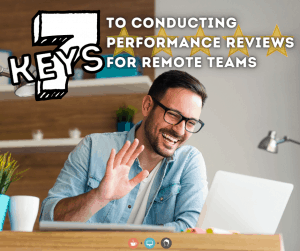How to Ditch Office Life and Land a Great Work-from-Home Job

After more than a year of working from home due to COVID-19 mitigations, you know that the work-from-home lifestyle has many advantages. The short commute, increased family time, and flexibility during the day are things moms appreciate. And, as the virus continues to spread, putting school plans up into the air, you may have additional reasons to love your home office and want to stay in it.
But, many employers are busy planning return-to-the-office strategies. If the prospect of returning to the office has you looking for another option that lets you work from home all the time, read on. After decades of helping moms like you make the jump to work-from-home jobs, here are my top tips for making the leap.
Make a Plan
Start by considering what you want in your work-from-home job. Think about the things you enjoy about your current job and make a list of the tasks and responsibilities you wish to transfer to your new role. For example, do you excel at project management? Maybe you have an eye for detail and are a great proofreader, or perhaps you are a spreadsheet whiz or a design guru and want to use those skills in your next role. There’s no right or wrong answer, just the ones that make the most sense to you.
Next, catalog your skills and abilities. Think big picture here to identify the skills you have that can be transferred to another job. (Sometimes HR people call these transferable skills.) For example, if you set up webinars for your current company, identify the skills involved in that task–such as negotiating contracts, issuing invitations, managing conflicts, and carefully reviewing invoices. These capabilities comprise your set of transferable skills.
If you aren’t sure what you want to do or how your skills may translate to different types of jobs, don’t worry, we’ve got you covered. HireMyMom offers resources to help.
- Check out the Top 10 Work From Home Jobs for Moms to see what’s popular.
- See these tips for finding at-home work without a lot of experience if you are thinking of changing career directions or are new to the workforce.
- Build your skillset with these free training options.
- Explore your entrepreneurial inclinations by learning how you can start your own Virtual Assistant Business.
Then, take the online Job Seeker 101 class offered by HireMyMom to learn more about the job search process.
If all this has you feeling overwhelmed, find inspiration from a recent success story.
Create a Job Search Strategy
Now that you are ready to search for an at-home job, it’s time to find the right partner in your journey. If you’ve spent any time on the big job boards, you know how tough it is to find good-quality leads there.
There is a better way.
When you join HireMyMom, you have exclusive access to a curated list of legitimate work-from-home jobs. Moms love us because they know all applications are going to real businesses looking for help. Employers love us because they know they can find high-quality, highly motivated candidates who want to work from home.
Yes, we do charge a small fee. But, that works to your advantage in five ways:
- No commissions from job seekers. Once you find a job, all the money you earn is yours to keep. We don’t take a commission of your earnings. Often, free job sites are only free until you find a job. Then, they help themselves to 10% to 20% of your pay as long as you have the job.
- The fee keeps the number of job seekers down, so it’s easier for you to stand out in the crowd. It also weeds out those who are not serious job seekers.
- Businesses prefer to use HireMyMom because job seekers who have paid the fee are serious about finding work. And the volume of resumes that flow in is more manageable than the numbers that arrive when jobs are advertised on free job sites. One business owner cited she received over 900 applicants in 24 hours on one of the free job sites.
- When you see a job post on HireMyMom, you can be assured it’s exclusive. We don’t pull jobs off the internet to fill our site. We only post positions that can’t be found elsewhere online.
- You can feel confident when you apply for a job on the site because we aim to keep HireMyMom 100% scam-free. Our team reviews each job post to ensure that the company (or person) looking for help is legit. We have a list of red flags we look for, and don’t hesitate to say no if we aren’t confident.
Still have questions? Check out Why Does HireMyMom Charge Job Seekers.
Find That Job
Once you have your strategy in place, designate time and space to identify job leads and apply. It can take some time to apply for jobs, so be sure to set that time aside and treat your job search like a job. Otherwise, it’s easy to get frustrated that you aren’t making progress.
One of your first tasks will be to update your resume. Small business resumes are different and more personal than corporate resumes. In addition, cover letters are a big part of the process. So, invest the time to get a solid cover letter base that you can customize for each opportunity. You can learn more about both techniques in the Job Seeker 101 class.
Once you land an interview, start to practice and prepare. Ask a friend or family member to help you rehearse. Find a nice quiet place in your home and do a dry-run with the technology used during the interview.
As part of your prep, think about the questions you’ll ask. The right questions are an essential tool in finding out if the job is a good fit for your skills, interests, and lifestyle, so be prepared to ask the right ones.
As you practice your interview, prepare a strong close. A strong finish can distinguish you from the crowd. Set yourself up for success with these steps:
- Thank the interviewer.
- Express your level of interest honestly.
- Summarize why you are a great candidate.
- Ask about the next steps and timing.
- Send a follow-up email within 48 hours of the interview.
Avoid Common Job Search Mistakes
When you apply for several jobs, it’s easy to make mistakes that can cost you an interview and an opportunity. It may seem counterintuitive, but being picky about the jobs you go after can help increase your success rate. Casting too wide a net can lead to rejections while sending you into a frenzy of activity, applying for jobs, and following up with employers only to be disappointed. Remember, you want to find the right job for you, not just any job. Before you apply:
- Carefully read the job description. Consider whether you are qualified for the bulk of the work and whether the position genuinely interests you.
- Tailor your resume for the specific job. Make the tweaks needed to fit the job description, but don’t do a total rewrite. Be sure to review your revised resume carefully.
- Write a customized cover letter. Clearly express your interest and qualifications in the letter.
Finally, hang in there. Finding a job can be hard work. Don’t get discouraged. You’ll be working at your new home-based job in no time. When you find success, send me a note so we can celebrate together.









